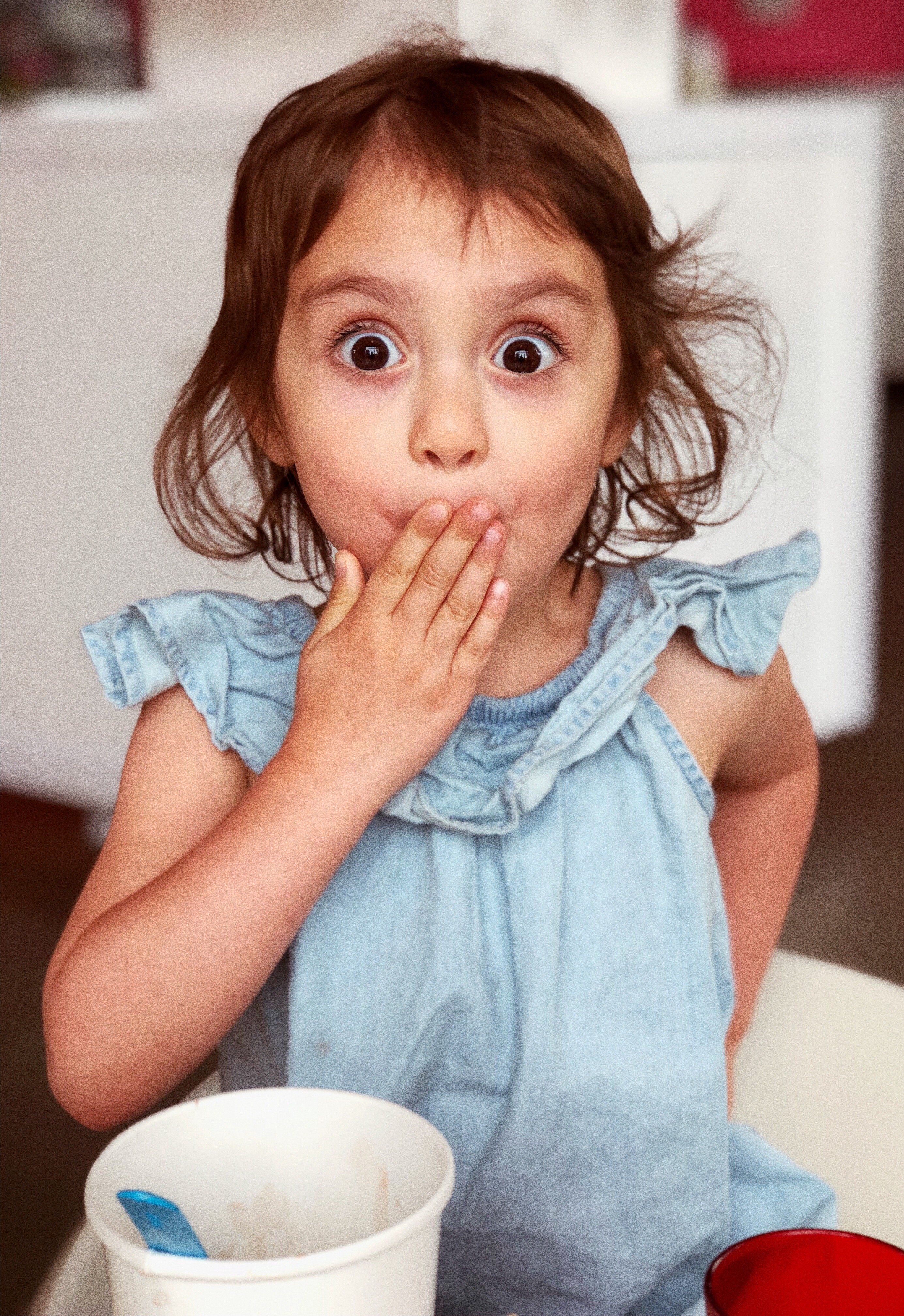Managing Behavior: Why Do Toddlers and Children Masturbate?
 Photo by Andre Guerra on Unsplash
Photo by Andre Guerra on Unsplash
The thought of genital stimulation in toddlers often makes adults squirm. The very word ?masturbation? is often associated with guilt and shame.
However, that is because we associate it with an adult sexual activity which it is totally not with children.
Your child is not losing their innocence.
Self-stimulation occurs as a result of the normal exploration of their bodies and discovering that some things feel nice, so they repeat them.
Simple as that.
There is no issue.
Girls touch and rub their genitals as much as boys do. Sometimes it takes girls a bit longer to discover these parts of their body as they don?t have a penis that immediately becomes erect when handled for toileting or washing, or just because it is ?there.? Little girls often initially discover pleasure in their genitals inadvertently by rocking on the edge of a chair or rubbing a cushion between their legs.
Parents can become acutely embarrassed when their toddler daughter is all red in the face and breathless on the edge of the couch in the middle of a family get together, however, this is totally normal behavior.
Teaching children what behavior is to be done in private and what is socially acceptable in public is the main aim of the game here. This comes with time and gentle encouragement, reminders, and distraction.
NEVER shame a child, tell them off, or discipline them for masturbating or self-stimulating. You are setting them up for a lifetime of shame and guilt associated with sexual pleasure that they will carry on into their adult lives.
It is estimated that nearly 100% of boys and at least 25% of girls have masturbated to the point of orgasm by the time they are 15 years old.
At What Age is Masturbation Normal?
Babies tug at their ears and toes from birth and by the age of six months it can occur frequently as they explore their body. Little boys will tug on their penis as a matter of course, as it is just ?there?.
Little girls around the age of 11 months usually have discovered their vulva and their hands will automatically tug and explore as they explore their body especially at bath time, swimming or when they have on no clothes.
Toilet or potty training is a time that children frequently can become obsessed with their genitals and little girls may actually insert objects into their vaginas (often crayons or marker caps) just like toddlers sometimes insert objects into their nose or ears.
Most children, both boys, and girls will tug on their genitals quite frequently by the time they are aged five or six years old. A study by the University of Michigan found that by the ages of five children of both sexes play with their genitals quite regularly.
It would be years before I educated myself and understood that it is completely normal for children to sometimes touch their sexual organs.
If masturbation becomes an obsession or compulsive then there are ways for parents or caregivers to detract and help children find more appropriate ways to release tension and manage anxiety, especially when in public.
Children do not generally associate genital stimulation with adult sexuality until adolescence.
Many children masturbate just because it feels good or to self soothe, and it is just as common as thumb or finger sucking.
Kids don?t see body parts as bad or good. They just are parts of their body that belong to them.
How Can Parents Manage This Behavior?
By the ages of five or six, the majority of children are socialized enough to understand masturbation is only something they should do in the privacy of their bedrooms.
Unless religion is used to morally condemn the practice a child will just see touching their body as a normal self-soothing and pleasurable behavior and will not feel any guilt and shame.
If you feel they are ?scratching? or ?itching? more than touching they may have an infection and should be taken to the doctor. It can be hard for toddlers to verbalize the difference in this regard.
Many parents of infant and toddler boys accept that their son has found their ?favorite toy,? but it can be confronting sometimes to realize that their toddler daughter engages in the same behavior for similar reasons ? that it feels good and nice and something that feels good and nice is usually repeated.
Helping a child differentiate between what can be done in private time and what can be done when in public is one of the best things that parents can do to help to diffuse any guilt or possible shame from developing in relation to their child?s relationship with their own body.
If your child is not getting enough positive attention from you, then getting your undivided attention from self-stimulation may encourage the behavior.
A parent can gently explain to the child that this is okay to do but must be done in the privacy of their room, or when other people are not around just like when they go to the toilet.
Parents need to understand that occasional masturbation of the genitals is not dirty or a sign of some deeper psychological problem. It is just a normal part of a child?s development and self discovery.
Why Do Toddlers Do This in Public?
Young children do not associate the behavior with adult sexual activity to be done in private so they do not worry or think about where or when they start to self stimulate their genitals. Self-stimulating of the genitals is no different to them than picking their nose or twirling their hair.
A parent may find children start to engage in touching themselves if they are nervous around other people or in public. Giving the child a teddy bear, or blanket or something they can hold may help to distract the child and provide comfort and soothing.
A parent giving a child extra hugs, cuddles and attention may also distract and soothe.
A bored child may engage in self-stimulation more frequently to help pass the time so providing an opportunity for your child to engage in games and distracting them with other toys is something a parent can do.
A parent could distract the child who has commenced touching themselves, with offering another toy they know they like or start to play a game with them to get them to stop touching their privates.
These are all gentle non-condemning and non-shaming ways that a parent can help a child to learn to not engage in this sort of behavior in public places.
Kids Health online explains that HOW a parent reacts will set the tone in teach ing their child about healthy sexuality later on down the track.
How you react ? your voice, the words you use, your facial expressions ? is one of your child?s first lessons in sexuality. By not responding with anger, surprise, or disapproving words, you teach your child that this curiosity about his or her body is a normal part of life.
What NOT to Do?
Do not threaten a child with saying things like, ?It will give you warts? or ?It will drop off if you keep touching it?.
Do not shame a child by saying they are dirty or disgusting.
Do not guilt trip a child by saying God hates what they are doing and can see them when they do this. This will set up a fear of God that will actually create the opposite of the image of God as an all loving and unconditionally loving father whom a child can trust.
Having an internalized image of a judgmental and fearful punishing God will lead to low self-esteem and may even impact on a child?s ability to engage in normal healthy sexual activity as an adult.
RELAX
- Masturbation will not turn your three-year-old child into a sex fiend.
- It will not cause them physical harm.
- There are no health risks.
- It will not cause them to become blind or deaf (old wives tales).
- It won?t affect their future procreation prospects.
When Should a Parent Be Alarmed?
- If a child shows an understanding of what occurs between both parties (male and female) in a sexual act.
- If a child simulates intercourse with another child.
- If the activity is painful for your child but they continue the behavior. Too much friction, due to rubbing, especially in girls, can lead to urinary tract infections. Engaging in rubbing to the exclusion of engaging in other play activity they normally would do also may also be a sign that something is quite seriously wrong.
- If the behavior appears compulsive and hard to stop or distract them from doing it. It is interfering in them participating in their normal activity and playtime.
- If the child appears distressed and appears to be trying to comfort themselves during the self-stimulation.
- If the child engages in the mouth to genital stimulation with another child.
- If the child engages in self-stimulation to such an extent, there appears to be scratching, bruising or damage to the area.
- If any penetrative sexual play activity with another child occurs.
If any of these things occur these MAY be a sign that something more untoward has occurred to the child either by another child, or adult or they have been exposed in some form or way to observing adult sexual activity.
Taking your child to a doctor or psychologist may be the most helpful thing you can do to determine if your child?s masturbation is no longer self-soothing but is indicative that abuse or inappropriate exposure to adult sexual activity has occurred.
However, the vast majority of infant, toddler, and masturbation in young people is TOTALLY normal behavior.
In Summary: Distract, help your child learn the difference between private and public behavior, provide other activities, provide other toys like a teddy or self soothing blanket they can carry to unfamiliar places if they are scared, and be careful of the tone of voice and language you use with them, so that they do not associate the activity with guilt or shame.
Remember, it is NOT a medical condition. It is nothing to worry about. It is completely normal and in the vast majority of cases is NOT associated with adult sexual behavior but is rather only related to self-exploration, self-soothing, and part of normal development.


